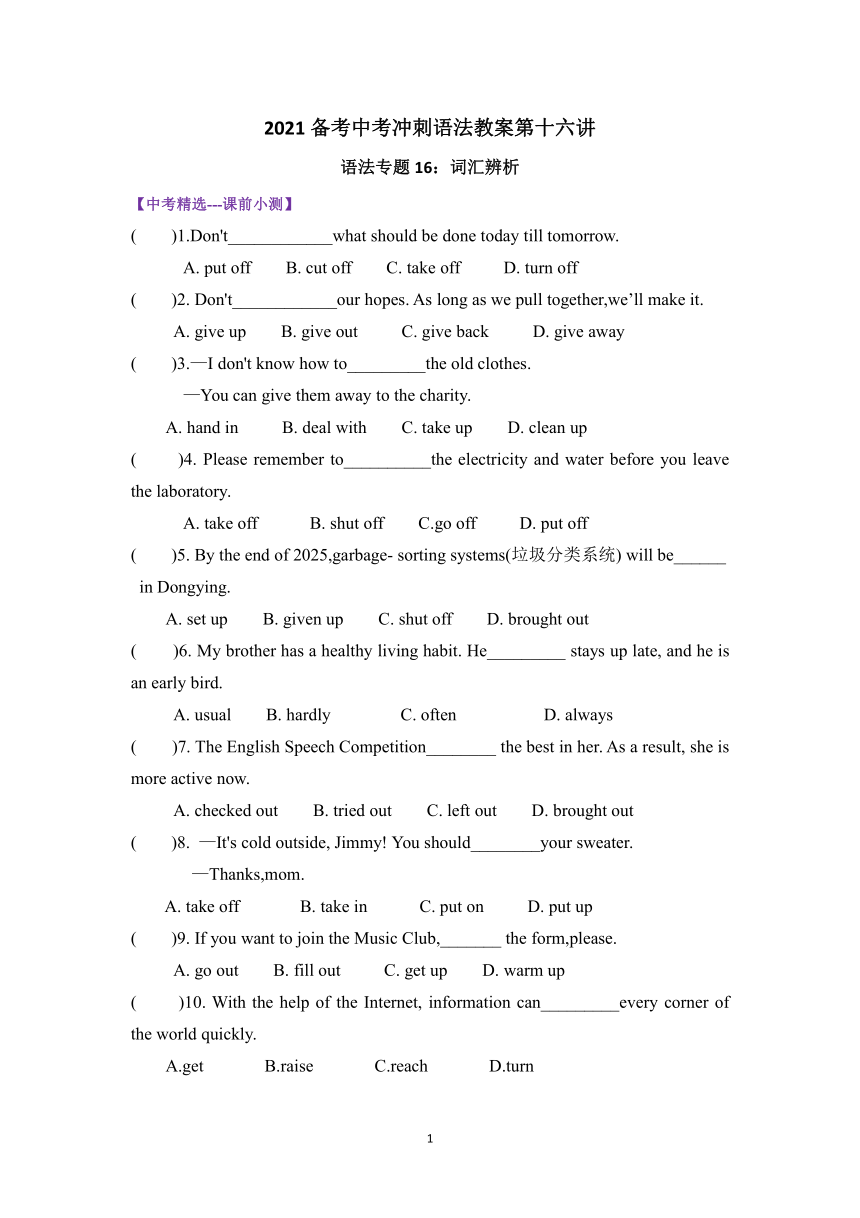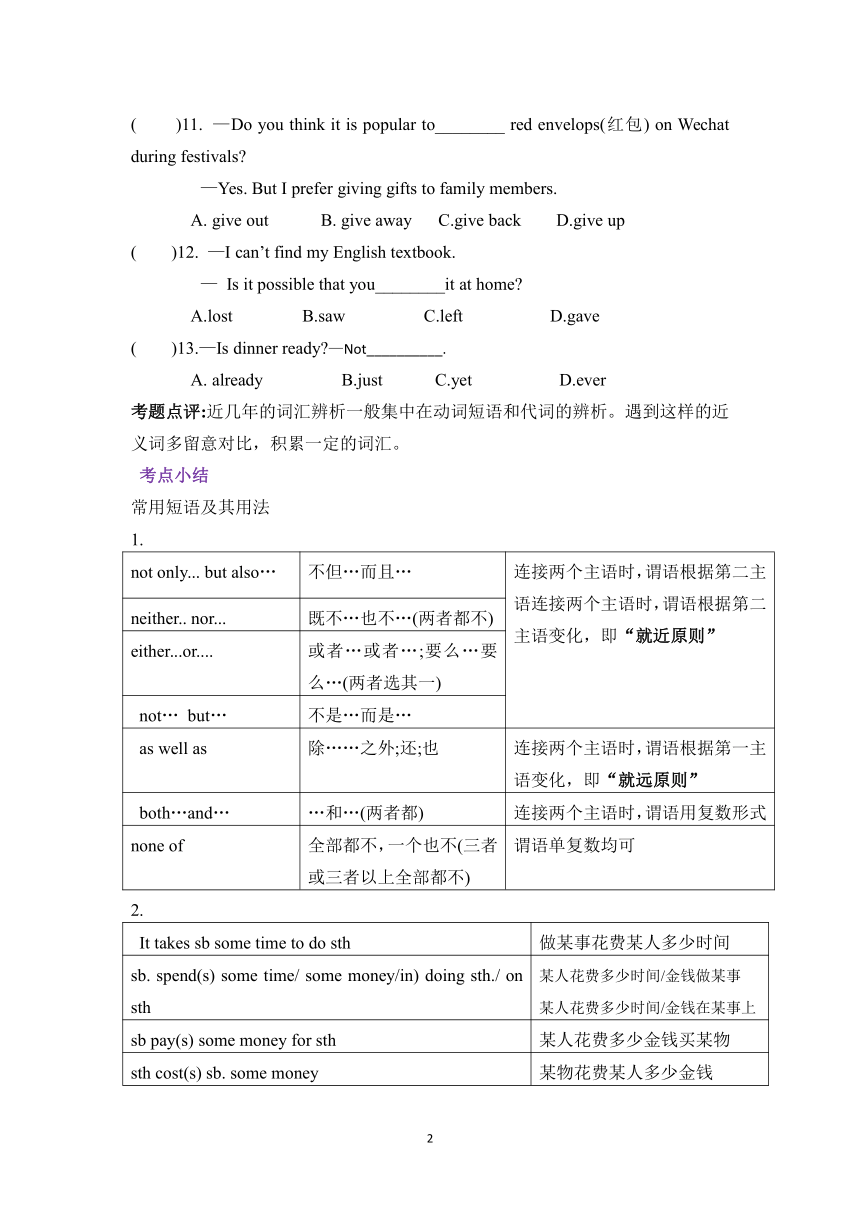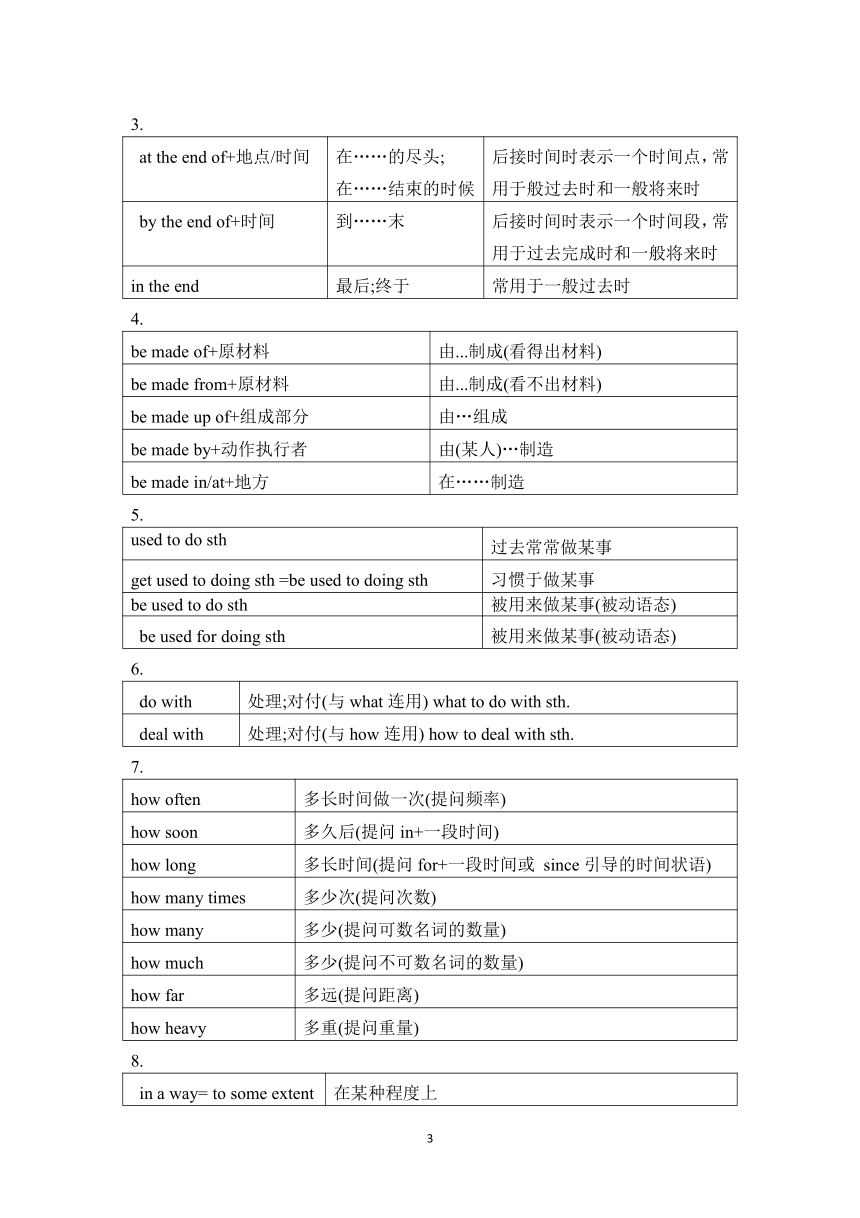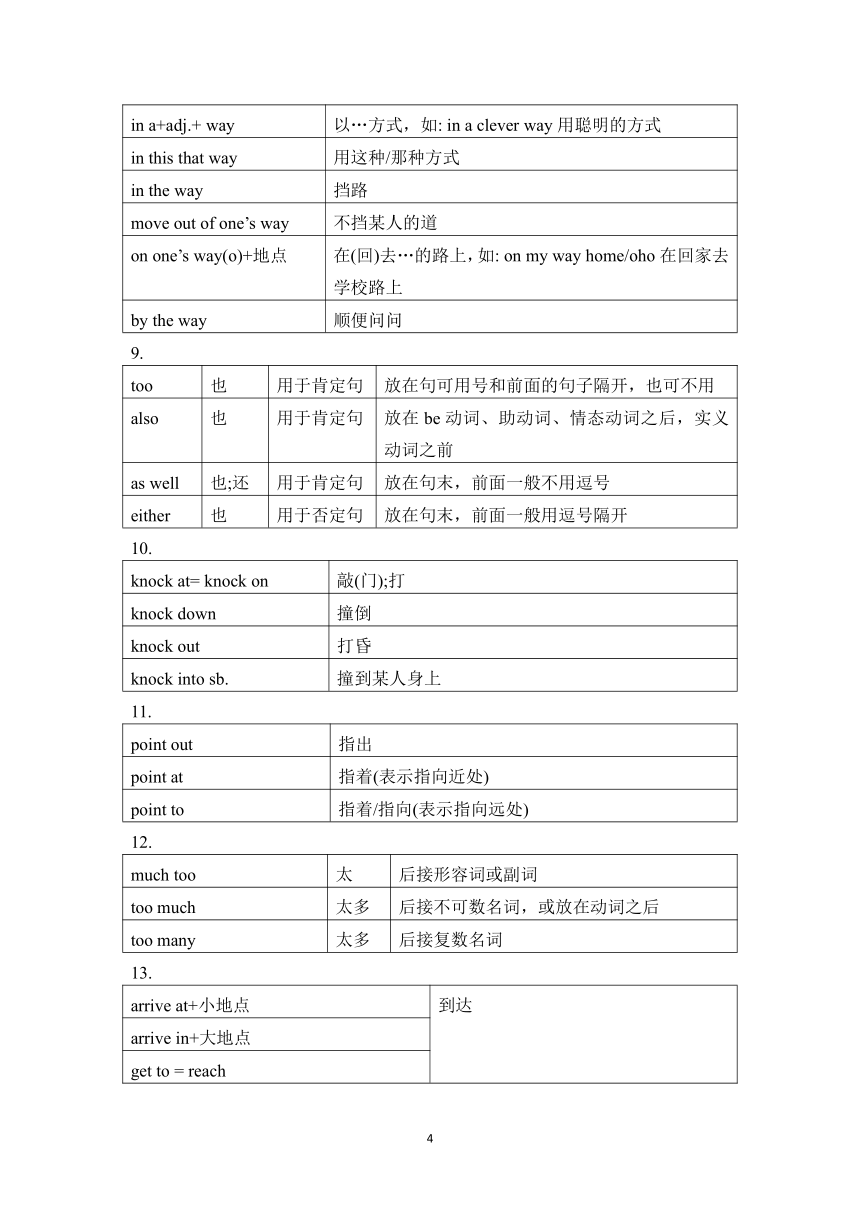2021年备考中考冲刺语法练习第十六讲 词汇辨析 (含中考精选题,考点总结,考点精练答案及讲解))
文档属性
| 名称 | 2021年备考中考冲刺语法练习第十六讲 词汇辨析 (含中考精选题,考点总结,考点精练答案及讲解)) |  | |
| 格式 | doc | ||
| 文件大小 | 112.5KB | ||
| 资源类型 | 教案 | ||
| 版本资源 | 牛津深圳版 | ||
| 科目 | 英语 | ||
| 更新时间 | 2021-04-25 11:27:26 | ||
图片预览




文档简介
2021备考中考冲刺语法教案第十六讲
语法专题16:词汇辨析
【中考精选---课前小测】
( )1.Don't____________what should be done today till tomorrow.
A. put off B. cut off C. take off D. turn off
( )2. Don't____________our hopes. As long as we pull together,we’ll make it.
A. give up B. give out C. give back D. give away
( )3.—I don't know how to_________the old clothes.
—You can give them away to the charity.
A. hand in B. deal with C. take up D. clean up
( )4. Please remember to__________the electricity and water before you leave the laboratory.
A. take off B. shut off C.go off D. put off
( )5. By the end of 2025,garbage- sorting systems(垃圾分类系统) will be______
in Dongying.
A. set up B. given up C. shut off D. brought out
( )6. My brother has a healthy living habit. He_________ stays up late, and he is an early bird.
A. usual B. hardly C. often D. always
( )7. The English Speech Competition________ the best in her. As a result, she is more active now.
A. checked out B. tried out C. left out D. brought out
( )8. —It's cold outside, Jimmy! You should________your sweater.
—Thanks,mom.
A. take off B. take in C. put on D. put up
( )9. If you want to join the Music Club,_______ the form,please.
A. go out B. fill out C. get up D. warm up
( )10. With the help of the Internet, information can_________every corner of the world quickly.
A.get B.raise C.reach D.turn
( )11. —Do you think it is popular to________ red envelops(红包) on Wechat during festivals?
—Yes. But I prefer giving gifts to family members.
A. give out B. give away C.give back D.give up
( )12. —I can’t find my English textbook.
— Is it possible that you________it at home?
A.lost B.saw C.left D.gave
( )13.—Is dinner ready?—Not__________.
A. already B.just C.yet D.ever
考题点评:近几年的词汇辨析一般集中在动词短语和代词的辨析。遇到这样的近义词多留意对比,积累一定的词汇。
考点小结
常用短语及其用法
1.
not only... but also… 不但…而且… 连接两个主语时,谓语根据第二主语连接两个主语时,谓语根据第二主语变化,即“就近原则”
neither.. nor... 既不…也不…(两者都不)
either...or....
或者…或者…;要么…要么…(两者选其一)
not… but… 不是…而是…
as well as
除……之外;还;也
连接两个主语时,谓语根据第一主语变化,即“就远原则”
both…and… …和…(两者都) 连接两个主语时,谓语用复数形式
none of 全部都不,一个也不(三者或三者以上全部都不) 谓语单复数均可
2.
It takes sb some time to do sth 做某事花费某人多少时间
sb. spend(s) some time/ some money/in) doing sth./ on sth 某人花费多少时间/金钱做某事
某人花费多少时间/金钱在某事上
sb pay(s) some money for sth 某人花费多少金钱买某物
sth cost(s) sb. some money 某物花费某人多少金钱
3.
at the end of+地点/时间
在……的尽头;
在……结束的时候 后接时间时表示一个时间点,常用于般过去时和一般将来时
by the end of+时间
到……末
后接时间时表示一个时间段,常用于过去完成时和一般将来时
in the end 最后;终于 常用于一般过去时
4.
be made of+原材料 由...制成(看得出材料)
be made from+原材料 由...制成(看不出材料)
be made up of+组成部分 由…组成
be made by+动作执行者 由(某人)…制造
be made in/at+地方 在……制造
5.
used to do sth 过去常常做某事
get used to doing sth =be used to doing sth 习惯于做某事
be used to do sth 被用来做某事(被动语态)
be used for doing sth 被用来做某事(被动语态)
6.
do with 处理;对付(与what连用) what to do with sth.
deal with 处理;对付(与how连用) how to deal with sth.
7.
how often 多长时间做一次(提问频率)
how soon 多久后(提问in+一段时间)
how long 多长时间(提问for+一段时间或 since引导的时间状语)
how many times 多少次(提问次数)
how many 多少(提问可数名词的数量)
how much 多少(提问不可数名词的数量)
how far 多远(提问距离)
how heavy 多重(提问重量)
8.
in a way= to some extent 在某种程度上
in a+adj.+ way 以…方式,如: in a clever way用聪明的方式
in this that way 用这种/那种方式
in the way 挡路
move out of one’s way 不挡某人的道
on one’s way(o)+地点 在(回)去…的路上,如: on my way home/oho在回家去学校路上
by the way 顺便问问
9.
too 也 用于肯定句 放在句可用号和前面的句子隔开,也可不用
also 也 用于肯定句 放在be动词、助动词、情态动词之后,实义动词之前
as well 也;还 用于肯定句 放在句末,前面一般不用逗号
either 也 用于否定句 放在句末,前面一般用逗号隔开
10.
knock at= knock on 敲(门);打
knock down 撞倒
knock out 打昏
knock into sb. 撞到某人身上
11.
point out 指出
point at 指着(表示指向近处)
point to 指着/指向(表示指向远处)
12.
much too 太 后接形容词或副词
too much 太多 后接不可数名词,或放在动词之后
too many 太多 后接复数名词
13.
arrive at+小地点 到达
arrive in+大地点
get to = reach
14.
would rather do sth than do sth. 宁愿做某事,而不愿做某事;比起做某事,更喜欢做某事
prefer to do sth. rather than do sth
prefer doing sth to doing sth
like doing sth better than doing sth
15.
turn on 关闭(电器、水源等)
turn off 打开(电器、水源等)
turn up 开大;调高(音量、热量等)
turn down 关小;调低(音量、热量等)
16.
have gone to+地点 去了某地(未回) 不可与for或 since连用
have been to+地点 曾经去过某地(已回) 不可与for或 since连用
have been in+地点 侍在某地 表示持续性,可与for或 since连用
17.
bring 带来 从别处带到说话者的地方来
take 带走 强调从说话者处带走
fetch 去拿来 指去拿回来,是一个往返的过程
carry 携带搬;抬;运;抱 不强调动作的方向
18.
miss 错过;怀念
lose 丢失;输了
forget 忘记(忘记了带东西时,一般后面不能接地点)
leave 遗忘;丢下(忘了带东西,遗留在某地时,一般后面接地点)
19.
try on+衣物 试穿(强调动作)
put on+衣物 穿上(强调动作)
wear+衣物 穿着(强调状态)
dress+人,不加衣物 给……穿衣
dress in+颜色/衣物 穿着
20.
borrow sth. from sb. 向某人借某物(借入) borrow是瞬间动词,不能与for或 since连用
lend sth. to sb 把某物借给某人(借出) lend是瞬间动词,不能与for或 since连用
keep 保管
keep是持续性动词,可以与for或 since连用
21.
noise 噪音;嘈杂声 指对身体有害的声音
voice 嗓音 指人的声音,有时可指鸟的声音
sound 声音;声响 泛指所有听得见的声音
22.
alone 独自的/地;单独的/地 强调一个人
lonely 狐独的;寂寞的;偏僻的;人迹罕至的 多用于形容人的心情和地方
23.
say 说
强调说的内容
say sorry /goodbye/ hello/ thank you to sb.;say it in English
speak 讲;讲话;
演讲;发言 强调说的能力(说话的能力;讲某种语言;演讲;发言) speak at the meeting, speak English
talk 谈话交谈;谈论 强调相互间的交谈
talk to sb., talk with sb. talk about sth,give a talk
tell 告诉;讲述;命令 把知道的东西告诉别人;叫某人做某事 tell a story, tell a lie,
tell the truth, tell sth to sb.;
tell sb to do sth
24.
win 贏得 赢得比赛、战争,获得奖品、奖学金、名誉、财产等
beat 打败 打败比赛、竞争中的对手或战争中的敌人
25.
some time 一段时间
用 how long提问,常与for连用,常用一般将来时或现在完成时
sometime 某时 常用一般将来时
sometimes 有时 用 how often提问,常用于一般现在时
some times 几次;几倍 用 how many times提问,常用于现在完成时
26.
look at 看 look after 照顾
look over 检查 look forward to 盼望;期待
look like 看起来像 look up 查阅;查询
look through 浏览 look down(upon) 俯视;瞧不起
27.
join
参加
通常指参加某种固定的组织、团队、军队、党派或某社会团体,强调成为其中一员
join in 参加
join sb.(in) doing sth.(和某人一起做某事),多指参加小规模的活动,如球赛、游戏等,常用于日常口语; join in表示“参加某项活动”时,可与 take part in互换,侧重娱乐、欣赏,而后者更侧重身体力行,参与其中
take part in
参加 指参加各种活动,包括文娱、体育、比赛、斗争、罢工等,往往指参加者持积极态度,在其中起作用
attend
出席;参加 主要用于参加比较重要或大型的场合、宴会、音乐会、会议或讲座等
【趁热打铁---考点精练】
( )1. The English exam was so difficult that___________students could pass it.
A. little B. a little C. few D. a few
( )2. —If you are OK, we will set off now.
—Don’t hurry. There is_________ time left. We can get there on time.
A. little B. a little C. few D. a few
( )3. Rose didn’t go there by bus. John didn’t__________.
A. also B.too C. either D. a few
( )4. —I don’t like this skirt. Would you show me__________ one?
—Yes. of course.
A. other B. the other C. others D. another
( )5. The girls in Guangzhou like_______ skirts in summer.
A. trying on B. putting on C. wearing D. dressing
( )6. —Here is a report for your mother._________ it home to her, please.
—Thank you.
A. Take B. Bring C. Carry D. Get
( )7. Don't make so much_________.”he said to us in a low__________.
A. sound;voice B. voice; noise C. noise; voice D. noise; sound
( )8. He said__________ of the children was sent a present that day.
A. each B. every C. all D. both
( )9. —Miss Zhu, can you__________ it in English for the guests?
-I’m sorry, I can’t__________English.
A. tell; say B. say; speak C. speak; say D. talk; speak
( )10. Jack_______3 dollars for a hamburger and_______two minutes in eating it.
A. paid; spent B. spent; paid C. cost; paid D. took; spent
( )11. —Do you know that professor who will give us a lecture?
—No, I’ve never_________ him before.
A. heard B. heard of C. heard from D. listened to
( )12. If you don’t know the new word, you can______it________in the dictionary.
A. look; on B. look;at C. look; for D. look; up
( )13. He thought and thought and_________the answer at last.
A. found out B. found C. looked for D. looked after
( )14. When they________there, the train had left already.
A. got to B. reached at C. arrived at D. arrived
( )15. The number of the students in our grade is 800. So we need____new books.
A. a large number of B. a great deal of C. a large amount of D. a lots of
参考答案:
【中考精选---课前小测】1-5AABBA 6-10BDCBC 11-13ACC
【趁热打铁---考点精练】1-5CBCDC 6-10ACABA 11-15BDADA
语法专题16:词汇辨析
【中考精选---课前小测】
( )1.Don't____________what should be done today till tomorrow.
A. put off B. cut off C. take off D. turn off
( )2. Don't____________our hopes. As long as we pull together,we’ll make it.
A. give up B. give out C. give back D. give away
( )3.—I don't know how to_________the old clothes.
—You can give them away to the charity.
A. hand in B. deal with C. take up D. clean up
( )4. Please remember to__________the electricity and water before you leave the laboratory.
A. take off B. shut off C.go off D. put off
( )5. By the end of 2025,garbage- sorting systems(垃圾分类系统) will be______
in Dongying.
A. set up B. given up C. shut off D. brought out
( )6. My brother has a healthy living habit. He_________ stays up late, and he is an early bird.
A. usual B. hardly C. often D. always
( )7. The English Speech Competition________ the best in her. As a result, she is more active now.
A. checked out B. tried out C. left out D. brought out
( )8. —It's cold outside, Jimmy! You should________your sweater.
—Thanks,mom.
A. take off B. take in C. put on D. put up
( )9. If you want to join the Music Club,_______ the form,please.
A. go out B. fill out C. get up D. warm up
( )10. With the help of the Internet, information can_________every corner of the world quickly.
A.get B.raise C.reach D.turn
( )11. —Do you think it is popular to________ red envelops(红包) on Wechat during festivals?
—Yes. But I prefer giving gifts to family members.
A. give out B. give away C.give back D.give up
( )12. —I can’t find my English textbook.
— Is it possible that you________it at home?
A.lost B.saw C.left D.gave
( )13.—Is dinner ready?—Not__________.
A. already B.just C.yet D.ever
考题点评:近几年的词汇辨析一般集中在动词短语和代词的辨析。遇到这样的近义词多留意对比,积累一定的词汇。
考点小结
常用短语及其用法
1.
not only... but also… 不但…而且… 连接两个主语时,谓语根据第二主语连接两个主语时,谓语根据第二主语变化,即“就近原则”
neither.. nor... 既不…也不…(两者都不)
either...or....
或者…或者…;要么…要么…(两者选其一)
not… but… 不是…而是…
as well as
除……之外;还;也
连接两个主语时,谓语根据第一主语变化,即“就远原则”
both…and… …和…(两者都) 连接两个主语时,谓语用复数形式
none of 全部都不,一个也不(三者或三者以上全部都不) 谓语单复数均可
2.
It takes sb some time to do sth 做某事花费某人多少时间
sb. spend(s) some time/ some money/in) doing sth./ on sth 某人花费多少时间/金钱做某事
某人花费多少时间/金钱在某事上
sb pay(s) some money for sth 某人花费多少金钱买某物
sth cost(s) sb. some money 某物花费某人多少金钱
3.
at the end of+地点/时间
在……的尽头;
在……结束的时候 后接时间时表示一个时间点,常用于般过去时和一般将来时
by the end of+时间
到……末
后接时间时表示一个时间段,常用于过去完成时和一般将来时
in the end 最后;终于 常用于一般过去时
4.
be made of+原材料 由...制成(看得出材料)
be made from+原材料 由...制成(看不出材料)
be made up of+组成部分 由…组成
be made by+动作执行者 由(某人)…制造
be made in/at+地方 在……制造
5.
used to do sth 过去常常做某事
get used to doing sth =be used to doing sth 习惯于做某事
be used to do sth 被用来做某事(被动语态)
be used for doing sth 被用来做某事(被动语态)
6.
do with 处理;对付(与what连用) what to do with sth.
deal with 处理;对付(与how连用) how to deal with sth.
7.
how often 多长时间做一次(提问频率)
how soon 多久后(提问in+一段时间)
how long 多长时间(提问for+一段时间或 since引导的时间状语)
how many times 多少次(提问次数)
how many 多少(提问可数名词的数量)
how much 多少(提问不可数名词的数量)
how far 多远(提问距离)
how heavy 多重(提问重量)
8.
in a way= to some extent 在某种程度上
in a+adj.+ way 以…方式,如: in a clever way用聪明的方式
in this that way 用这种/那种方式
in the way 挡路
move out of one’s way 不挡某人的道
on one’s way(o)+地点 在(回)去…的路上,如: on my way home/oho在回家去学校路上
by the way 顺便问问
9.
too 也 用于肯定句 放在句可用号和前面的句子隔开,也可不用
also 也 用于肯定句 放在be动词、助动词、情态动词之后,实义动词之前
as well 也;还 用于肯定句 放在句末,前面一般不用逗号
either 也 用于否定句 放在句末,前面一般用逗号隔开
10.
knock at= knock on 敲(门);打
knock down 撞倒
knock out 打昏
knock into sb. 撞到某人身上
11.
point out 指出
point at 指着(表示指向近处)
point to 指着/指向(表示指向远处)
12.
much too 太 后接形容词或副词
too much 太多 后接不可数名词,或放在动词之后
too many 太多 后接复数名词
13.
arrive at+小地点 到达
arrive in+大地点
get to = reach
14.
would rather do sth than do sth. 宁愿做某事,而不愿做某事;比起做某事,更喜欢做某事
prefer to do sth. rather than do sth
prefer doing sth to doing sth
like doing sth better than doing sth
15.
turn on 关闭(电器、水源等)
turn off 打开(电器、水源等)
turn up 开大;调高(音量、热量等)
turn down 关小;调低(音量、热量等)
16.
have gone to+地点 去了某地(未回) 不可与for或 since连用
have been to+地点 曾经去过某地(已回) 不可与for或 since连用
have been in+地点 侍在某地 表示持续性,可与for或 since连用
17.
bring 带来 从别处带到说话者的地方来
take 带走 强调从说话者处带走
fetch 去拿来 指去拿回来,是一个往返的过程
carry 携带搬;抬;运;抱 不强调动作的方向
18.
miss 错过;怀念
lose 丢失;输了
forget 忘记(忘记了带东西时,一般后面不能接地点)
leave 遗忘;丢下(忘了带东西,遗留在某地时,一般后面接地点)
19.
try on+衣物 试穿(强调动作)
put on+衣物 穿上(强调动作)
wear+衣物 穿着(强调状态)
dress+人,不加衣物 给……穿衣
dress in+颜色/衣物 穿着
20.
borrow sth. from sb. 向某人借某物(借入) borrow是瞬间动词,不能与for或 since连用
lend sth. to sb 把某物借给某人(借出) lend是瞬间动词,不能与for或 since连用
keep 保管
keep是持续性动词,可以与for或 since连用
21.
noise 噪音;嘈杂声 指对身体有害的声音
voice 嗓音 指人的声音,有时可指鸟的声音
sound 声音;声响 泛指所有听得见的声音
22.
alone 独自的/地;单独的/地 强调一个人
lonely 狐独的;寂寞的;偏僻的;人迹罕至的 多用于形容人的心情和地方
23.
say 说
强调说的内容
say sorry /goodbye/ hello/ thank you to sb.;say it in English
speak 讲;讲话;
演讲;发言 强调说的能力(说话的能力;讲某种语言;演讲;发言) speak at the meeting, speak English
talk 谈话交谈;谈论 强调相互间的交谈
talk to sb., talk with sb. talk about sth,give a talk
tell 告诉;讲述;命令 把知道的东西告诉别人;叫某人做某事 tell a story, tell a lie,
tell the truth, tell sth to sb.;
tell sb to do sth
24.
win 贏得 赢得比赛、战争,获得奖品、奖学金、名誉、财产等
beat 打败 打败比赛、竞争中的对手或战争中的敌人
25.
some time 一段时间
用 how long提问,常与for连用,常用一般将来时或现在完成时
sometime 某时 常用一般将来时
sometimes 有时 用 how often提问,常用于一般现在时
some times 几次;几倍 用 how many times提问,常用于现在完成时
26.
look at 看 look after 照顾
look over 检查 look forward to 盼望;期待
look like 看起来像 look up 查阅;查询
look through 浏览 look down(upon) 俯视;瞧不起
27.
join
参加
通常指参加某种固定的组织、团队、军队、党派或某社会团体,强调成为其中一员
join in 参加
join sb.(in) doing sth.(和某人一起做某事),多指参加小规模的活动,如球赛、游戏等,常用于日常口语; join in表示“参加某项活动”时,可与 take part in互换,侧重娱乐、欣赏,而后者更侧重身体力行,参与其中
take part in
参加 指参加各种活动,包括文娱、体育、比赛、斗争、罢工等,往往指参加者持积极态度,在其中起作用
attend
出席;参加 主要用于参加比较重要或大型的场合、宴会、音乐会、会议或讲座等
【趁热打铁---考点精练】
( )1. The English exam was so difficult that___________students could pass it.
A. little B. a little C. few D. a few
( )2. —If you are OK, we will set off now.
—Don’t hurry. There is_________ time left. We can get there on time.
A. little B. a little C. few D. a few
( )3. Rose didn’t go there by bus. John didn’t__________.
A. also B.too C. either D. a few
( )4. —I don’t like this skirt. Would you show me__________ one?
—Yes. of course.
A. other B. the other C. others D. another
( )5. The girls in Guangzhou like_______ skirts in summer.
A. trying on B. putting on C. wearing D. dressing
( )6. —Here is a report for your mother._________ it home to her, please.
—Thank you.
A. Take B. Bring C. Carry D. Get
( )7. Don't make so much_________.”he said to us in a low__________.
A. sound;voice B. voice; noise C. noise; voice D. noise; sound
( )8. He said__________ of the children was sent a present that day.
A. each B. every C. all D. both
( )9. —Miss Zhu, can you__________ it in English for the guests?
-I’m sorry, I can’t__________English.
A. tell; say B. say; speak C. speak; say D. talk; speak
( )10. Jack_______3 dollars for a hamburger and_______two minutes in eating it.
A. paid; spent B. spent; paid C. cost; paid D. took; spent
( )11. —Do you know that professor who will give us a lecture?
—No, I’ve never_________ him before.
A. heard B. heard of C. heard from D. listened to
( )12. If you don’t know the new word, you can______it________in the dictionary.
A. look; on B. look;at C. look; for D. look; up
( )13. He thought and thought and_________the answer at last.
A. found out B. found C. looked for D. looked after
( )14. When they________there, the train had left already.
A. got to B. reached at C. arrived at D. arrived
( )15. The number of the students in our grade is 800. So we need____new books.
A. a large number of B. a great deal of C. a large amount of D. a lots of
参考答案:
【中考精选---课前小测】1-5AABBA 6-10BDCBC 11-13ACC
【趁热打铁---考点精练】1-5CBCDC 6-10ACABA 11-15BDADA
同课章节目录
- 词法
- 名词
- 动词和动词短语
- 动词语态
- 动词时态
- 助动词和情态动词
- 非谓语动词
- 冠词
- 代词
- 数词和量词
- 形容词副词及其比较等级
- 介词和介词短语
- 连词和感叹词
- 构词法
- 相似、相近词比较
- 句法
- 陈述句
- 一般疑问句和否定疑问句
- 特殊疑问句及选择疑问句
- 反意疑问句
- 存在句(There be句型)
- 宾语从句
- 定语从句
- 状语从句
- 主谓一致问题
- 简单句
- 并列句
- 复合句
- 主谓一致
- 主、表语从句
- 名词性从句
- 直接引语和间接引语
- 虚拟语气
- 感叹句
- 强调句
- 倒装句
- 祈使句
- 句子的成分
- 句子的分类
- 题型专区
- 单项选择部分
- 易错题
- 完形填空
- 阅读理解
- 词汇练习
- 听说训练
- 句型转换
- 补全对话
- 短文改错
- 翻译
- 书面表达
- 任务型阅读
- 语法填空
- 其他资料
